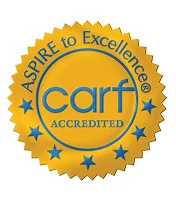Home / Inpatient Mental Health Treatment Program / PTSD Treatment Program
PTSD Treatment, New England
Granite Recovery Centers provides expert care for post-traumatic stress disorder (PTSD), with evidence-based therapies, licensed clinicians, and a safe, structured recovery path.
Accreditations for Quality Care





Benefits of PTSD Treatment
Evidence-Based Trauma Care
Cognitive-behavioral therapy (CBT), dialectical behavior therapy (DBT), EMDR, and PE help you process events safely.
We offer mindfulness-based training, yoga, fitness and nutrition, and meditation to sustain well-being.
Family Involvement
Family counseling improves communication, rebuilds trust, and equips loved ones to reinforce your trauma recovery.
Ongoing Support After Discharge
We connect you to outpatient treatment, alumni groups, and peer support for stability after treatment.
CPTSD vs. PTSD:
Differences in Trauma Disorders
Post-traumatic stress can look different from person to person. Below are the most common types, each with its own symptoms and treatment needs.
Types of PTSD
Acute Stress Disorder
A short-term response that may develop into post-traumatic stress disorder if symptoms last beyond one month.
Complex PTSD (C-PTSD)
Caused by ongoing or repeated trauma, this type often affects emotions, relationships, and sense of safety.
Uncomplicated PTSD
Triggered by a single event, this form involves flashbacks, anxiety, and nightmares but allows daily functioning.
Comorbid PTSD
PTSD that occurs alongside depression, anxiety, or substance use often requires dual diagnosis treatment.

Is PTSD a Disability?
Post-traumatic stress disorder can qualify as a disability if it seriously limits your ability to function. Many people, including veterans, may be eligible for benefits through the VA or other programs when symptoms interfere with work or daily life.
PTSD Therapy at Granite Recovery Centers
At Granite, we begin with a clinical evaluation, then use trauma-informed therapies like CBT, DBT, EMDR (eye movement desensitization and reprocessing), and PE (prolonged exposure therapy) to support PTSD recovery by processing distressing events and regulating emotions.
When needed, medication can ease symptoms like anxiety, depression, or sleep issues. We also provide mental health prescriptions and medication-assisted treatment (MAT) for participants with a co-occurring substance use disorder.

Levels of Care
24-Hour Residential Mental Health Treatment
Our Inpatient Program provides daily guidance for those needing full-time care and separation from everyday stressors.
Partial Hospitalization Program (PHP)
Partial Hospitalization offers trauma-focused counseling five days a week in a stable setting, with evenings spent at home.
Intensive Outpatient Program (IOP)
Intensive Outpatient Programs deliver clinical care several times per week while supporting work, school, or family life.
Outpatient Mental Health Program
Outpatient Rehab sustains PTSD recovery through weekly sessions tailored to trauma recovery and long-term goals.
Veteran and First Responder Support
Rally Point Recovery includes trauma-specific therapies and peer connection for military and first responder participants.
Success Stories
“My name is Jan and have been to Green Mountain Rehab and it did wonders for me.”
-J.J.
“The most caring recovery team that works there.”
-B.B.
“Green Mountain Treatment Center saved my life. I was sick and scared when I arrived, but the transformation that occurred for me during the 80 days I spent on the mountain was nothing short of a miracle.”
-C.
“The staff at granite recovery are amazing. Never in my life have I seen a group of people so passionate about what they do who genuinely care about others.”
-S.C.
Choosing Our PTSD Treatment Centers
Granite Recovery Centers offers trauma-informed PTSD treatment across New Hampshire in calm, structured spaces led by licensed clinicians and evidence-based therapy. Whether you’re starting fresh or continuing care, we help you move forward with clarity and confidence.

Frequently Asked Questions
How do you know if you have PTSD?
If you’ve gone through a difficult event and still have flashbacks, anxiety, or emotional numbness after a month, it may be post-traumatic stress disorder. A licensed clinician can evaluate your symptoms and offer a diagnosis.
What is the best treatment for PTSD?
The best care includes clinical interventions like CBT, EMDR, and exposure therapy. Many also benefit from medication, peer support, and holistic practices.
Can PTSD cause hallucinations?
Hallucinations are uncommon but can happen, especially when post-traumatic stress disorder co-occurs with other mental health conditions like psychosis or severe dissociative disorder.